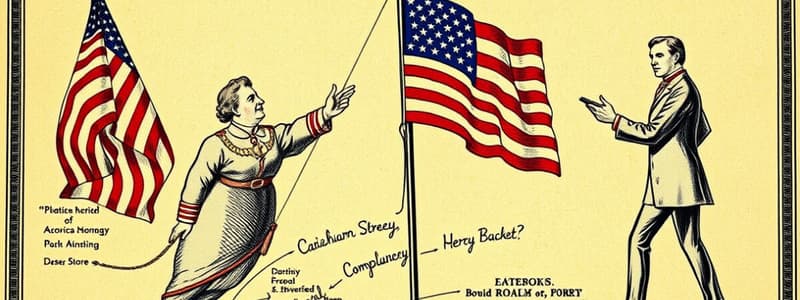Podcast
Questions and Answers
What was Dollar Diplomacy?
What was Dollar Diplomacy?
Dollar Diplomacy was the policy of using America's financial power to extend their influence abroad, making other nations dependent on the dollar.
With which major foreign policy of 1903 did Dollar Diplomacy begin?
With which major foreign policy of 1903 did Dollar Diplomacy begin?
Dollar Diplomacy started when Theodore Roosevelt forced through the building of the Panama Canal.
What was the main aim of Dollar Diplomacy?
What was the main aim of Dollar Diplomacy?
To prevent any European intervention in Latin America by managing the financial affairs of countries deemed 'backwards' by US standards.
What actions were the US prepared to take to prevent European intervention in Latin America?
What actions were the US prepared to take to prevent European intervention in Latin America?
Why did William Taft introduce Dollar Diplomacy?
Why did William Taft introduce Dollar Diplomacy?
Which of the following countries did Dollar Diplomacy impact? (Select all that apply)
Which of the following countries did Dollar Diplomacy impact? (Select all that apply)
What were some impacts of Dollar Diplomacy?
What were some impacts of Dollar Diplomacy?
Flashcards are hidden until you start studying
Study Notes
Dollar Diplomacy Overview
- Dollar Diplomacy utilized U.S. financial power instead of military force to extend influence abroad, aiming to create economic dependency on the U.S. dollar.
- The policy prioritized economic leverage over direct military interventions, contrasting with Theodore Roosevelt's "Big Stick" approach.
Origin of Dollar Diplomacy
- Emerged with the construction of the Panama Canal, which was pushed through by Theodore Roosevelt in 1903, ensuring U.S. control over the canal for a fee.
Main Objectives
- Aimed to prevent European intervention in Latin America by managing financially weaker countries, ensuring they could repay debts to European nations through U.S. financial support.
- Targeted nations perceived as economically "backward" according to U.S. standards.
Actions Taken to Enforce Dollar Diplomacy
- The U.S. offered loans to Latin American countries to pay off European creditors, aiming to stabilize their economies under U.S. financial guidance.
- Introduced efficient tax collection, standardized budgets, and a gold standard to align these economies with American interests.
William Taft's Role
- William Taft promoted Dollar Diplomacy as a Progressive foreign policy, favoring economic strategies over military action to expand U.S. influence.
Countries Affected by Dollar Diplomacy
- Major impacts seen in Costa Rica, Guatemala, Honduras, Haiti, Dominican Republic, Nicaragua, Liberia, Japan, Russia, and China.
Consequences of Dollar Diplomacy
- Created tensions with Costa Rica and Guatemala, who perceived the policy as imperialism, rejecting treaties that embodied Dollar Diplomacy principles.
- Strained relations with Honduras after the U.S. acquired its national debt, leading to a rejection of treaty agreements.
- Complications in Nicaragua arose as the U.S. supported a revolution against President Zelaya, driving a wedge in diplomatic relations.
- Resulted in significant American economic control within Nicaragua, as U.S. businesses acquired substantial shares in key industries, mandating cooperation from the Nicaraguan government.
- Despite criticisms, Dollar Diplomacy helped maintain the nominal independence of multiple Latin American states while exerting American influence.
Studying That Suits You
Use AI to generate personalized quizzes and flashcards to suit your learning preferences.




